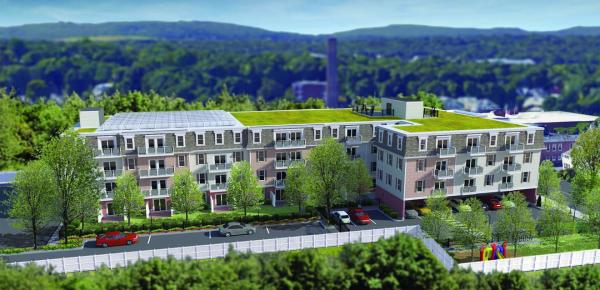September 27, 2018

A rendering of the proposed building at 1120-1132 Washington Street in Lower Mills as seen in a document filed with the Boston Planning and Development Agency last year. BPDA image
Developers hoping to build a four-story condo complex in Lower Mills on the current site of the John G. Molloy Funeral Home will need to earn renewed support of their proposal from residents and local activists who expect to hear a revised plan from the development team at a meeting of the Lower Mills Civic Association next month.
The project has been under review by the Boston Planning and Development Agency (BPDA) since earlier this year, and its progress has been snarled with obstacles, including scrutiny about the historic nature of the existing buildings at 1120-1132 Washington St., which will be demolished under the proposal.
Last week, the BPDA posted a collection of written comments from neighbors and abutters that indicate strong opposition to the current plan for the 57-unit building. The comments express dissatisfaction with various aspects of the City Point LLC-led proposal, including parking and traffic issues that some residents believe are already extreme in the village.
The original proposal won a narrow approval (12-9) from the Lower Mills Civic Association two years ago, in October 2016. Mike Skillin, president of the Lower Mills Civic Association, said that the project will need to be voted on again after the group is given details of the latest plan. “The project has many changes since the vote was taken over a year ago,” he said.
Thomas Maistros, Jr. of Adams Street, a member of the Lower Mills Civic Association executive board, offered a detailed explanation of his qualms in a letter. He objected to the transportation, environmental, and historical issues raised by the project, as well as the design of the building itself, which he deemed to be “nothing like that existing [architectural] fabric nor does it make any effort to respect that fabric.” The facade design “presents the same tired features of cheaply built suburban apartment buildings,” Maistros added, summing up his assessment of the project thusly: “Approval of zoning variances sought for the City Point development is based on the benefits/burdens test: do the benefits of the proposed development justify the burdens placed on Lower Mills. The answer is no.”
The Lower Mills-based architect Gary Tondorf-Dick also voiced his opposition to demolishing or altering the historically significant buildings on the property, noting their Greek Revival design and their status in the historical narrative of a proposed Lower Mills Historic District. “This proposed development will negatively impact the neighborhood character and streetscape by altering by demolition a very significant part of the 17th, 18th, 19th, and 20th century streetscape of Washington Street in Lower Mills village,” he wrote.
Alena Kuzub-Eisen expressed similar concerns and proposed an alternative by which the historic homes and the development might coexist. “The parking lots around the funeral home and behind the houses make for enough space to build an L-shaped apartment building,” she wrote. “The historical houses should be included into the project, preserved and renovated to their historical glory.”
Meanwhile, Kitty Keough, a direct abutter to the property, wrote that owners of the development have refused to meet with her. She voiced concerns that the size of the proposed development would both invade her privacy and reduce the amount of sunlight received by her garden.
In another submission, Thomas Moriarty named a lack of parking spots as his biggest concern. “I feel strongly that the BPDA should hold this development to the 1.5 spot per unit zoning code to prevent overflow parking ending up on these residential streets,” he wrote. “The BPDA should be attempting to hold developers to standards that protect the existing neighborhoods and not be granting unneeded zoning relief to big money developers, who in the end will walk away from all the problems or benefits of a project as soon as construction is complete.”
According to a representative from the BPDA, the comments received during the last Impact Advisory Group (IAG) meeting on August 21 remain under review.


